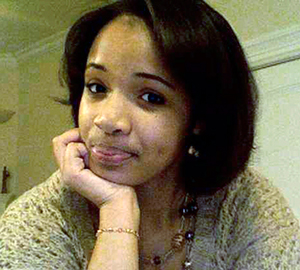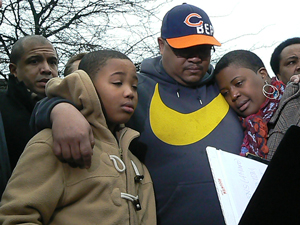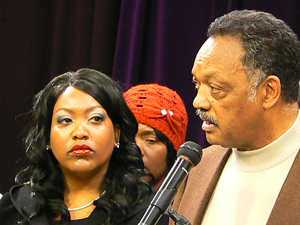Loss of promising Black teen renews questions about continued problems of urban violence
By La Risa Lynch Contributing Writer | Last updated: Feb 5, 2013 - 1:27:45 PMWhat's your opinion on this article?
The loss of promising Black teen renews questions about continued problems of urban violence, youth development and what to do to save lives and bring peace to Black America.

This undated file family photo provided by Damon Stewart shows 15-year-old Hadiya Pendleton of Chicago. Pendleton was shot and killed Tuesday, Jan. 29, 2013, in a Chicago park as she talked with friends by a gunman who apparently was not even aiming at her. Photo: AP/Wide World photo
|
She was an honor roll student at King College Prep High School on Chicago’s South Side. She was a majorette in the school’s marching band that, just a week earlier, participated in President Barack Obama’s inauguration parade.
Hadiya’s life seemed ahead of her. But on an unseasonable warm winter’s day, a bullet ended all that. And her death has intensified the national debate on gun control and the effectiveness of anti-violence initiatives.
“They took the light of my life. …She was destined for great things and you stripped that from her,” said Hadiya’s father Nathaniel Pendleton, to the killers of his 15-year-old daughter.
Temperatures reached into the 60s on Jan. 29, a welcome break from Chicago’s traditionally bitterly cold weather. Hadiya headed to a South Side park to hang out with friends and take advantage of the warm weather. When the skies opened for a downpour, the teens sought shelter under a canopy in the park.

Nathaniel Pendleton Sr. embraces his family, from left, Nathaniel Jr. and right, his wife Cleopatra, while attending a news conference in the shooting murder of their daughter, 15 year-old Hadiya Pendleton. Hadiya was struck in the back as she and several friends sought shelter from the rain. A $40,000 reward has been offered in the teen’s death. Photo: LaRisa Lynch
|
That’s when an unidentified gunman exited a white Nissan and opened fire on the group of teens in the park less than a mile from President Obama’s home, according to police. A bullet struck Hadiya in the back killing her. Two other teens were wounded in what Chicago police have called a gang related shooting.
Hadiya’s death comes as Chicago struggles to get a grip on escalating gun violence. Last year, the city saw its homicide rate top more than 500 murders, an increase not seen since 2008 when the city had 513 homicides, according to police crime reports.
And according to an article in the Chicago Reporter, an investigative monthly magazine, nearly half of those homicide victims were youth under age 25. Hadiya’s death brought the city’s homicides to 42 in January.
Now the manhunt is on to find Hadiya’s killers as community activists pleaded with witnesses to come forward. They urged residents to not give Hadiya’s killers immunity under the no snitching code that permeates some urban communities. A reward of $40,000 has been offered. Chicago police are combing through leads, but no arrests had been made.
“We cannot let the offenders get away with this senseless tragedy,” said Police Superintendent Garry McCarthy. “We need community participation to investigate and to bring to successful conclusion these cases. The fact is, we have very little to go on. The fact is, we know that somebody knows something.”
“This is Sandy Hook. This is Connecticut. This is Newtown, right here and we have to be just as outraged,” said Father Michael Pfleger, pastor of St. Sabina Church and a staunch advocate for tougher gun laws.
Father Pfleger called the reward a bounty on the killer’s head, but he too asked for community help in solving this case.
“The police come in when the crime happens. When do we stand up and make them (gangbangers) afraid to do a crime on our blocks?” he asked.
Shatira Wilks, Hadiya’s cousin, appealed to the suspects’ family’s sense of morality to turn individuals in. Devastation doesn’t describe what the family is enduring, but the lack of information only compounds the loss, she said.

Shatira Wilks, Hadiya Pendleton’s cousin, stands with the Rev. Jesse Jackson Sr. in an appeal to bring forth Hadiya’s shooter and to stop gang violence. Photo: LaRisa Lynch
|
“What kind of person are you?” Ms. Wilks asked. “You know your cousin. You know your relative. You know who’s done this. …There is no way you can tell me that nobody knows anything.”
Supt. McCarthy called the gang related shooting a case of mistaken identity. He said Hadiya was not part of a gang nor were the friends with her in the park that day. He believes gangbangers thought they were shooting at rival members who were on their turf.
“We believe that somebody (had) mistaken the group that was hanging out here and returned with a firearm and fired into the crowd killing Hadiya,” he said.
Supt. McCarthy along with Mayor Rahm Emanuel vowed to put more resources on the streets to tackle rising gun violence. They plan to shift 200 officers from desk duty to the streets. The aim is to assign additional officers to districts with high gang activity.
But some community activists question that strategy, saying the issue of gang and gun violence is a social one that cannot be policed away. Phillip Jackson, founder of the Blackstar Project, an education advocacy group, contends Supt. McCarthy’s more police on the streets strategy won’t work.
“For the past two or three years that has been their strategy—more police, more police, more police. What did it give us? It gave us a record number of deaths in Chicago,” he said. “The more police they put on the street the more homicides. They don’t get it … and they keep getting the same results.”
Phillip Jackson contends the police are using an antiquated “military strategy to fight a social problem.” He said no jobs, poor schools and broken homes are breeding grounds for violence.
Even if Supt. McCarthy puts 5,000 more cops on the streets that wouldn’t stop one murder, Phillip Jackson argued. Strategies, he said, that focus on intervention cannot be effective long term. “Even if you are successful intervening tonight on a murder that doesn’t stop that same murder from happening tomorrow.”
Reducing crime starts by providing positive role models, providing an education that is globally relevant and providing a sustainable economic alternative to the black market economy, Phillip Jackson said. Telling a young Black man to pull his pants and get a job is not the answer, he added.
Also Phillip Jackson said rebuilding the family is a crime fighting tool on the front end. When a young person has a gun in his hand, it’s too late. While Mr. Jackson said Supt. McCarthy is a nice person, “he is not qualified to get into the minds, spirits and hearts of young Black men to stop them from killing other young Black men.”
Rev. Jesse L. Jackson Sr., president of Rainbow PUSH/Coalition, took the issue a step further. He called the issue of gun violence a matter of homeland security. He said the assault-style weapons used to kill school children in Newton, Conn., and moviegoers in Aurora, Colo., pose a threat to national security. These weapons, he explained, have the power to “blow up railroads and shoot down airplanes.”
“We need Homeland Security here, not just the police,” Rev. Jackson said. “Chicago is in a peculiar situation. This is an international crisis in Chicago. It is not a local city crisis.”
Rev. Jackson contends the international drug trade and lax gun laws fuel urban violence and that mandates a national response. He said gangbangers don’t manufacture drugs or guns.
He called on President Obama to come to his hometown to speak specifically to Chicago’s urban violence. The president’s presence, Rev. Jackson said “shows ultimate national seriousness.”
There has been a push to get President Obama to attend Hadiya Pendleton’s funeral, which was set for Feb. 8. As of Final Call deadline, there was no word that would occur. But, the president and first lady Michelle Obama called the family to express their sympathies.
Hadiya’s death came during congressional hearings on gun control. When asked about the death during a recent White House press briefing, press secretary Jay Carney called it a tragedy anytime a young person loses their life to gun violence.
Spokesman Carney said the president wants to strike a balance between sensible gun laws and the rights of people to bear arms.
“The fact that we can’t solve this problem entirely doesn’t mean we shouldn’t try to solve it in part,” Mr. Carney said. “We need to take action to reduce gun violence.”
Some action the president outlined in his gun control proposal includes renewing the ban on assault weapons, background checks on all gun sales including at gun shows and private sales and creating a federal gun trafficking statute.
But Tio Hardiman of Ceasefire, a Chicago-based violence prevention group, contends while gun control is part of the solution, there also should be a re-thinking of the criminal justice system. He said there should be a two-tiered prison system: one punitive and the other focusing on changing behavior.
“Mass incarceration feeds into the culture of violence,” Mr. Hardiman said. When marginal criminals whose backgrounds include auto theft and small drug sales are locked up with hardcore criminals, they are put in a “place where they can learn how to become a better criminal,” Mr. Hardiman explained.
Marginal criminals, he said, should be placed in an institution that focuses on changing behavior since violence is learned. Violence in certain populations has become the “norm” where people “think this is an everyday struggle in the ghetto,” Mr. Hardiman said.
“A lot of the guys I talk to say that retaliation has become an instinct for them,” he said. “If one of their friends got shot and killed, they are going to retaliate. We got to help people learn to calm down and think … on a higher level. If you are stuck in a culture of violence … (then) violence has become a way of life. You have to show people you can unlearn that type of behavior.”
Ms. Wilks too wants the shooting to end. She said her cousin wanted to make a difference in the world. She hopes her cousin’s death is used to that end.
“Chicago is becoming a place where we are becoming comfortable with death,” she said. “I don’t want to become comfortable with death. I don’t like the idea of that.”
INSIDE STORIES AND REVIEWS
-
-
About Harriett ... and the Negro Hollywood Road Show
By Rabiah Muhammad, Guest Columnist » Full Story -
Skepticism greets Jay-Z, NFL talk of inspiring change
By Bryan 18X Crawford and Richard B. Muhammad The Final Call Newspaper @TheFinalCall » Full Story -
The painful problem of Black girls and suicide
By Charlene Muhammad -National Correspondent- » Full Story -
Exploitation of Innocence - Report: Perceptions, policies hurting Black girls
By Charlene Muhammad -National Correspondent- » Full Story -
Big Ballin: Big ideas fuel a father’s Big Baller Brand and brash business sense
By Bryan Crawford -Contributing Writer- » Full Story






 Click Here Stay Connected!
Click Here Stay Connected!








